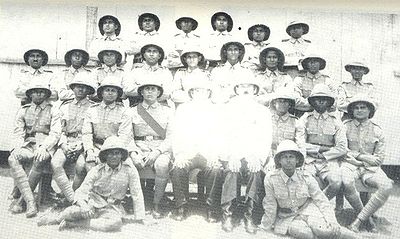
Indian Platoon (Fiji)
Encyclopedia

Creation of the platoon
According to historian, K.L. Gillion, the platoon was created within the Fiji Defence ForceMilitary of Fiji
The Republic of Fiji Military Forces are the military of the Pacific island nation of Fiji. With a total manpower of 3,500 active soldiers and 6,000 reservists, it is one of the smallest militaries in the world. However, most of its surrounding island nations have no militaries at all...
in 1934 as part of Governor Fletcher's policy of giving Fiji Indians greater recognition and opportunity to participate in the general life of the Colony of Fiji
Fiji
Fiji , officially the Republic of Fiji , is an island nation in Melanesia in the South Pacific Ocean about northeast of New Zealand's North Island...
and to encourage them to regard Fiji as their permanent home. The platoon was made up of ethnic Indians but the platoon commannder and the non-commissioned officers were Europeans. The formation of the platoon was opposed by the two prominent Europe
Europe
Europe is, by convention, one of the world's seven continents. Comprising the westernmost peninsula of Eurasia, Europe is generally 'divided' from Asia to its east by the watershed divides of the Ural and Caucasus Mountains, the Ural River, the Caspian and Black Seas, and the waterways connecting...
an members of the Legislative Council
Legislative Council (Fiji)
The Fijian Legislative Council was the colonial precursor to the present-day Parliament, which came into existence when Fiji became independent on 10 October 1970.-The first Legislative Council:...
, Sir Maynard Hedstrom and Sir Henry Scott.
According to John Dunham Kelly and Martha Kaplan, the platoon had been constituted to celebrate a Royal visit - "the Colonial Secretary had visions of a line of red turbans to complement the dramatic jagged-edged black-and-white uniforma of the Armed Native Constabulary" . The turban never materialised but the commandant found the attachment of this unit to an otherwise European battalion, "awkward".
History
In 1916, Manilal DoctorManilal Doctor
Manilal Maganlal Doctor was an Indian-born, London educated lawyer and politician, who travelled to numerous countries of the British Empire, including Fiji, Mauritius and Aden, providing legal assistance to the local ethnic Indian population...
, the de facto
De facto
De facto is a Latin expression that means "concerning fact." In law, it often means "in practice but not necessarily ordained by law" or "in practice or actuality, but not officially established." It is commonly used in contrast to de jure when referring to matters of law, governance, or...
leader of the Fiji Indians tried to persuade the colonial government of Fiji to form an Indian platoon for the war effort. He sent the names of thirty-two volunteers to the government but his requests were ignored. A number of Fiji Indians went to New Zealand
New Zealand
New Zealand is an island country in the south-western Pacific Ocean comprising two main landmasses and numerous smaller islands. The country is situated some east of Australia across the Tasman Sea, and roughly south of the Pacific island nations of New Caledonia, Fiji, and Tonga...
to volunteer to join the New Zealand Army
New Zealand Army
The New Zealand Army , is the land component of the New Zealand Defence Force and comprises around 4,500 Regular Force personnel, 2,000 Territorial Force personnel and 500 civilians. Formerly the New Zealand Military Forces, the current name was adopted around 1946...
and one of these served in Europe.
Dispute over pay
Prior to the start of the Second World War, soldiers had served voluntarily and were paid "capitation grants" according to efficiency ratings without regard to race. On 8 September 1939 (One week after the Nazi invasion of Poland), Fiji mobilised its Defence Force and changed its system of wages under which European privates were paid four shillings per day and non-European privates two shillings per day. The Indian platoon members refused to accept their pay. The Commandant of the Fiji Defence Force asked for the every member of the platoon to be dismissed. The Governor refused to dismiss them and praised the European second lieutenant who persuaded them to accept non-European pay.Disbandment
The platoon was disbanded in 1940 and the reason given for this action during a war was shortage of equipment as explained by the Governor two years later:
military considerations at the time necessitated the disbandment of the Indian Platoon, which had given eight years of voluntary service in the Fiji Defence Forces. This disbandment was not due in any sense to unwillingness on the part of the Indians to serve in the armed forces of the colony.
but the real reason for this action was that members of the platoon had asked for equal pay with the Europeans and the New Zealand military authorities (who commanded the Fiji Army at the start of the War) feared that this dissatisfaction could spread to the rest of the army, which was mainly ethnic Fijian
Fijian people
Fijian people are the major indigenous people of the Fiji Islands, and live in an area informally called Melanesia. The Fijian people are believed to have arrived in Fiji from western Melanesia approximately 3,500 years ago, though the exact origins of the Fijian people are unknown...
.
According to Kelly, in November 1941, the soldiers of the platoon again asked to make a case for equal pay. Each member of the platoon was then separately asked to accept non-European pay, refused and was dismissed with the support of the new Governor.

